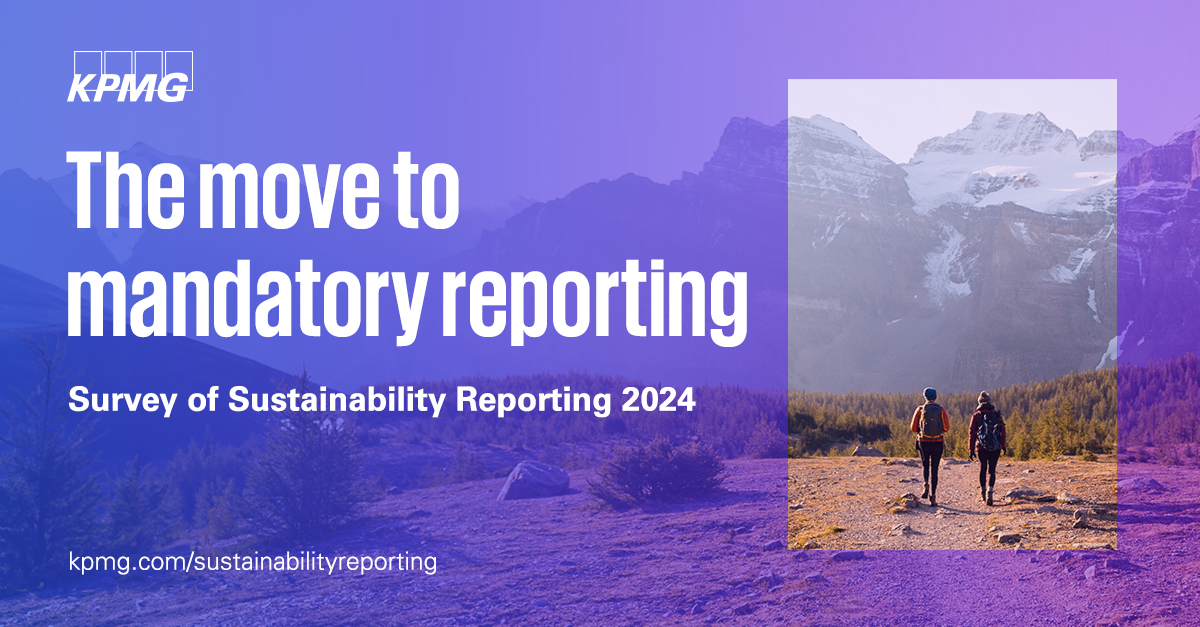
Press Release
• 95% of world’s top 250 companies now publishing carbon targets (2022: 80%)
• More than half (56%) of the top 250 companies now have a sustainability leader (2022: 45%)
• Almost one third (30%) of top 100 companies consider sustainability in leadership pay (2022: 24%)
With mandatory sustainability reporting nearly upon us, new research from KPMG reveals the world’s biggest companies are taking a proactive approach, with a significant increase in businesses already publishing ESG data, including carbon reduction targets.
First launched in 1993, the KPMG Survey of Sustainability Reporting is produced every two years, providing analysis of the sustainability and ESG reports from 5,800 companies across 58 countries and jurisdictions. With more than 180,000 items of data combined into a single dataset, the report offers a truly comprehensive review of current progress on ESG reporting by the world’s biggest businesses. The analysis includes data on ‘N100s’ – the world’s top 100 companies and the ‘G250’ – the world’s 250 largest companies by revenue based on the 2023 Fortune 500 rankings.
The findings of KPMG’s Survey of Sustainability Reporting 2024 indicate some major trends:
1. Reporting on sustainability and setting carbon targets has become part of business as usual. Both sustainability reporting and carbon targets have been adopted by almost all of the G250 global group of companies and four-fifths of the N100 groups.
2. Some companies have already changed practices in advance of the move to mandatory reporting on sustainability under the EU’s CSRD. The directive applies to an initial group of companies for reports on financial years ending from 31 December 2024, with some having until 2029 to publish their first compliant reports. However, some companies, mainly European-headquartered or with activities in Europe, are already preparing for CSRD such as by reporting material topics in accordance with the ESRS. Nearly half of European companies in the research already make disclosures using the EU Taxonomy.
3. Double materiality, required under CSRD, is now used by half of the largest companies. Nearly four-fifths of both the G250 and N100 groups use materiality assessments. The larger G250 companies are more likely to use double materiality processes that assess both impacts on society and the environment and how this affects their financial performance. Double materiality is the most complete form of materiality assessment and is a cornerstone of compliance with the EU’s CSRD, so some of those adopting it are likely to be doing so to prepare for it becoming mandatory.
4. Despite moves towards mandatory reporting, voluntary guidelines and standards remain widely used. GRI remains the most popular standard, with three-quarters of G250 companies using it and nearly as high a proportion of the N100 groups. There have been increases in use for other standards, although from lower bases.
5. Reporting on biodiversity continues to increase. Around half of both the G250 and N100 groups now report on biodiversity, up from around one-quarter four years ago, although growth has been slower in the last two years.
The world is facing complex climate, social and geopolitical issues and addressing ESG priorities is more important than ever. The last two years have seen some companies and investors weakening and, in some cases, abandoning ESG commitments. However, KPMG’s Survey of Sustainability Reporting shows that the largest companies worldwide are engaged with at least some elements of its agenda, such as, by setting carbon reduction targets.
































